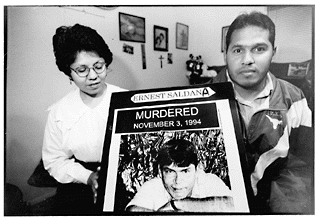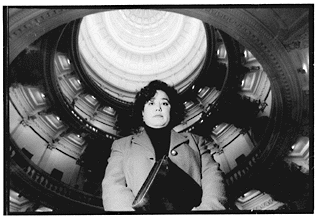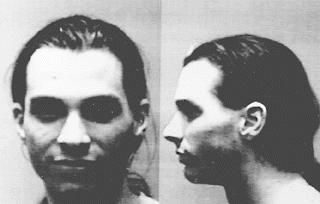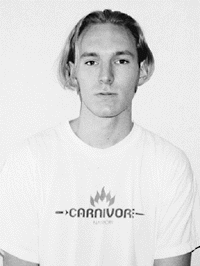The Hate Crimes Debate
Murders of Gay Men Cause Concern
By Amy Smith, Fri., March 14, 1997

Denise Guerrero and Cruz Saldaña hold a memorial plaque of their brother, Ernest Saldaña, who was beaten to death in 1994. |
His killers, who reportedly shouted "Joto! Joto!," (Spanish slang for faggot) during the attack, are now serving out lengthy prison sentences. "They knew Ernest from the neighborhood and they knew he was gay," says Saldaña's sister, Denise Guerrero. "They came to Ernest's house acting like his best friend, and then they stomped him and killed him."
The homophobic nature of the murder was never addressed during the homicide trials, but his family decided to speak out in defense of their gay son and brother. Working with the Lesbian/Gay Rights Lobby of Texas (LGRL), the family had hoped the brutal killing would lead to passage of a stronger hate crime bill in the 1995 Texas Legislature. It didn't. The measure failed by two votes, but is now back for round two this legislative session.

Dianne Hardy-Garcia of the Lesbian/Gay Rights Lobby of Texas is working for passage of a stronger hate crimes bill |
Since the bill failed to win the needed votes two years ago, seven other gay men have been murdered across Texas, three of them in the Austin area. Last summer was an especially trying one for local gay activists. Three men were killed within weeks of each other in unrelated homicides. The first death in July involved a 10-year government employee, Bruce Becker, 36, who police say was beaten and stabbed by a man he had befriended on the Drag and taken to his home (see related story).
That same month, Pablo Zuniga, 31, was found fatally stabbed on Town Lake's north shore, just southeast of the Four Seasons Hotel, on a trail where gay men cruise for sex partners.
In August, David Johnson, 37, was seen leaving an Austin bar on Red River with a man he had met that night. He was found dead the next morning about a mile from his home in Wimberley.
In the case of Zuniga, who was deaf and unable to speak, police arrested and charged 21-year-old Charles Edward Lowery, whose murder trial is pending. Lowery's attorney, Chris Gunter, doesn't dispute that his client stabbed Zuniga, but he says he did so in self-defense. He says Lowery, who lived in an apartment near Town Lake, was sitting on a park bench smoking a cigarette when Zuniga "appeared out of nowhere" and tried to grab his cigarette. "My guy kind of shoos him away," Gunter says, and Zuniga returned and placed a knife under Lowery's chin. It was then that Lowery took his own knife and stabbed Zuniga in the chest, Gunter says. Police say Zuniga was found with his pants unzipped, his genitals exposed, and his pockets turned inside out. There was no weapon found near the body. Lowery turned himself in to police Sept. 13, more than a month after the killing.

Charles Edward Lowery stands accused of killing Pablo Zuniga |
In Hays County, sheriff's detectives say robbery was the motive behind the beating death of David Johnson. The suspect, Jayson Perry Hawkins, 21, was a singer in a New Braunfels-based band -- Stigma -- that had performed the night of August 9 at the Blue Flamingo on Red River Street here in Austin. According to Detective Mitchell Johnson, the two had left the bar in a taxi on the way to Johnson's home in Wimberley, south of Austin. The cab driver told investigators that once in Wimberley, the two got out of the cab and began walking. The next morning, Johnson's body was found in the middle of Gold Rush Road. His head had been smashed by a rock weighing between 30 to 40 pounds.
Johnson was known as a bit of a loner who lived on his father's property in a rural section of Wimberley. He worked as a volunteer at the San Marcos Public Library for two years -- first as part of his community service restitution for a drunk driving conviction. Then, once he'd served his time at the library, Johnson decided to continue working there on a volunteer basis, says his supervisor Diane Insley. Johnson "was very talkative and friendly," she says. "He had a big grin and nice teeth. He just looked like a Texan."
All told, 22 gay men have been murdered across the state since 1988. In overall hate crimes, which include crimes based on sexual orientation, race, ethnicity, and religion, 1,600 have been recorded since 1992, with 15.7% involving crimes against lesbians and gays. And needless to say, the number doesn't include the victims who never report the crimes.
"Texas has always been willing to enhance penalties for many, many types of crimes -- until it comes to lesbians and gays," Hardy-Garcia says. "It hurts me to the core to know that people don't believe we deserve to have the same rights."
What makes the murders of gay men difficult to generate sympathy and outrage in the heterosexual world is an age-old, blame-the-victim mentality. Many of the men were killed by strangers they met at a bar, an adult video store, or while cruising parks or other areas where gay men converge.

Jayson Perry Hawkins is charged with the murder of David Johnson |
Austin homicide Lt. David Parkinson says that pick-up crimes occur all too often in both homosexual and heterosexual encounters. But men are more likely to commit murder, he adds. "With heterosexuals, the crime doesn't always end in homicide... because women are not usually impulse killers. Heterosexual men are more likely to get picked up in bars and lured back to a hotel room where they are robbed by the woman's partner in crime," he says.
Clearly, men who pick up strange men run a risk. "In this day and time you simply can't put yourself in harm's way by meeting up with strangers," Lt. Parkinson says. "Sooner or later, it's going to catch up to you."
Then again, Ernest Saldaña never got a chance to make that choice. His killers picked him.
Thousands of gay rights supporters will march in Austin next week to champion passage of a stronger hate crimes bill in Texas. The march is from noon-4pm Sunday, March 23, beginning at Palmer Auditorium and ending at the State Capitol. Call the Lesbian/Gay Rights Lobby of Texas, 474-5475 for information.
Got something to say on the subject? Send a letter to the editor.








